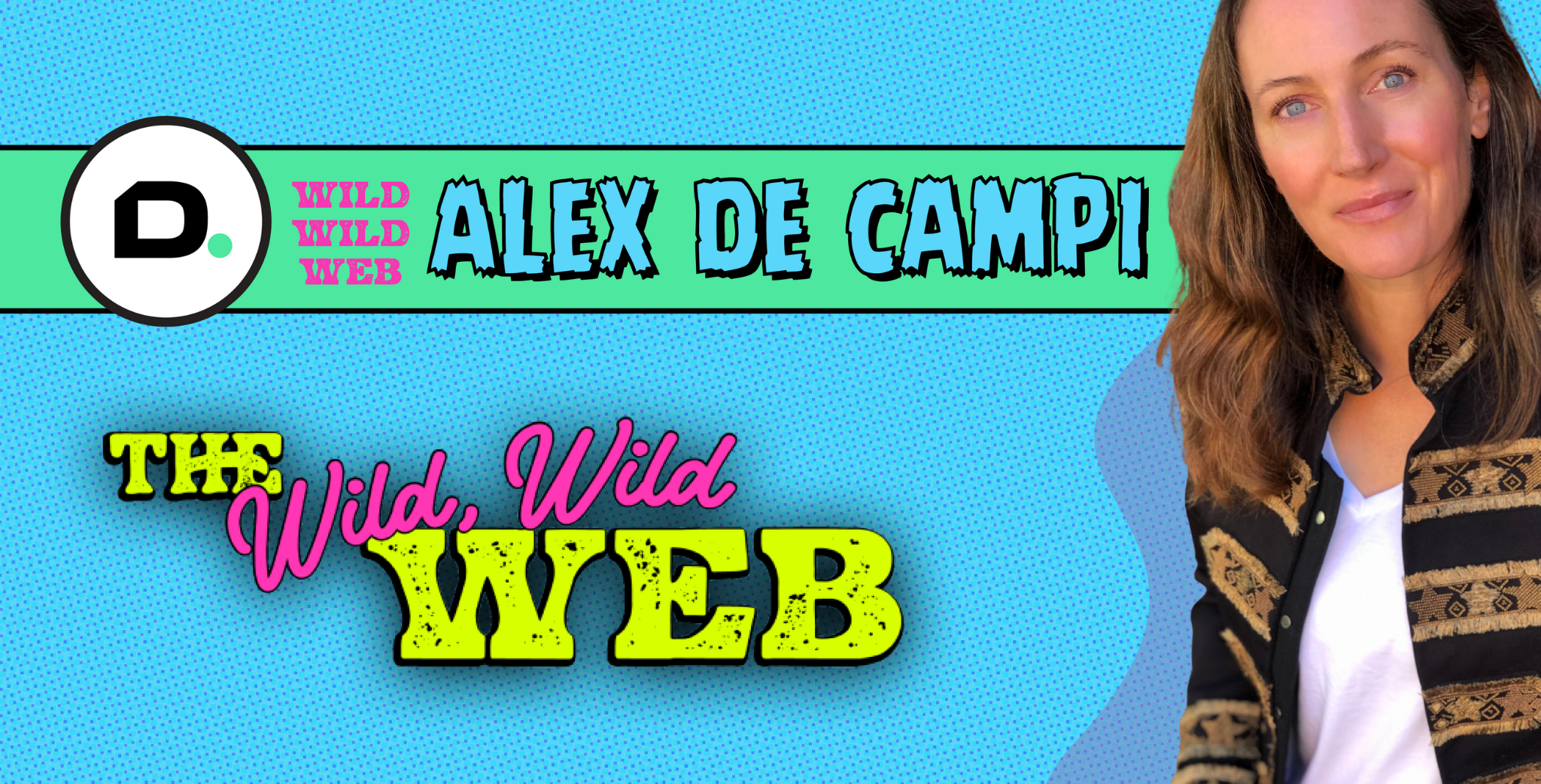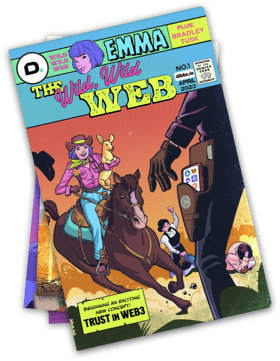Introducing Dibbs' Comic Book, "The Wild, Wild Web"
Dibbs is releasing its debut comic book, The Wild, Wild Web, featuring Emma and her pet Sandy, who explore the world of web3.

Dibbs is proud to announce our debut comic book, The Wild, Wild Web, a story about the adventures of our protagonist, Emma and her four-legged companion, Sandy, as they explore the fascinating world of web3.
This comic book highlights the opportunities that web3 presents, as well as ideas to create a trusted environment between brands and their users.
Subscribe to get our best content in your inbox
By clicking “Submit” you agree to Dibbs
Privacy Policy and
consent to Dibbs using your contact data for newsletter purposes.

Wild, Wild Web NFT
An NFT for the digital representation of the comic book is readily available right now! It's free aside from a negligible gas fee.
Wild, Wild Contributors
This comic book would not be possible without the contributions of Alex de Campi, Ben Plomion, Bradley Tusk, Bryan Bartlett, Chris Peterson, Kelly Fitzpatrick and Evan Vandenberg.
Wild, Wild Behind-the-Scenes
Alex de Campi is the comic book writer that we were lucky enough to work with to produce this project. She gives us a behind-the-scenes look into her creative process for writing and creating this work of art.
Dibbs: How did this comic book come about and what piqued your interest specifically about this topic? It's so different from your other works.
Alex: I had done a comic before for Ben [Plomion], who's Dibbs' Chief Marketing Officer. One of the head revenue guys was a very close friend of mine. When Ben and Bryan [Bartlett] had started talking about doing something comic-y, Ben emailed me.
I think a lot of blockchain is a solution in search of a problem right now. But I could see the benefit of what Dibbs was doing specifically in my world, and very easily for both fans and brands and people who have physical collectibles simply from being involved in comics.
You see all these like [Jack] Kirby comic book pages going for almost like getting up to millions of dollars now. Kirby's estate gets $0. It's a regular thing that you see in older comic book artists, ‘cause it's all freelance work – even the Marvel and DC stuff. Running GoFundMe's for their diabetes treatment, or people having to post pictures of them drawing or coloring a comic while they're in hospital because the deadlines won't let up and they need the money.
I love the idea of people potentially being able to sell their physical comic book pages via somewhere like Dibbs, or auction them off via an auction house with Dibbs. Every time the comic book page is resold, the creators continue to get a cut for it.
The traditional secondary market is wonderful, but it does almost nothing for the people who made the stuff. I’ve bought stuff on eBay and it's either not quite what it says it is, it's in worse condition, it gets beat up in shipping, or parts of it are missing. And that's the best you can do. It would be great to know that, if you're buying something that's a collectible, what the real condition of it is, whether it's complete, whether it's safe, et cetera. From the buyer's side, there are a ton of advantages.
Dibbs: Knowing how artists typically feel about the ethics of NFTs, especially when it comes to PFPs, and AI technology and aspects of web3 like that, was it challenging to come up with an art team to convey web3 and NFTs in this way?
Alex: I was certainly down to a much smaller group of artists than I could have normally gone towards. I think the appeal to the art team was simply that Dibbs had an actual product and solved an actual need, a need that people understood. I was like, "Think about selling a page of art. Think about continuing to get paid as it gets bid up over time." And it was around physical collectibles, rather than something intangible they can't really see the value of on a long-term basis. It was people who trusted me and who had worked with me before, so they knew I wasn't in their DMs going, "HI, HAVE YOU CONSIDERED NFTs?!" which artists deal with on an almost daily basis.
Dibbs: Amazing feat being able to accomplish this project with such high value, high quality coloring and storytelling. There's a distinct colorway difference between web2 and web3 in the comic. Can you talk about how you came up with that and how you landed on those color palettes?
Alex: The colors were also a lot based on a project that the artist, Chris Peterson, had already done for and Bryan saw that and was like, "That feels very web3." And we wanted to have these two separate worlds to show differences and similarities of how we see everything right now.
Web3, which is very wild, wild west in that there is money being made. There are potentially great changes in the way we do things that will occur. But also, Bisbee, Arizona was like the second biggest city in the west after San Francisco in 1870. The date might be wrong. Now, it's like just this podunk, non-existent town that has nothing but tourists, cuz there was a gold rush and a silver rush. There are gonna be places like that as web3 develops, that were seen as, “This is the whole capital of our future,“ and then it's gonna be a ghost town in five years, not, not 50, ‘cause things move faster now. We kind of ran with that metaphor, but rather than make it look old time-y, we wanted to make it look very futuristic. So we kept it very bright. The colors were influenced a lot by the coloring of PFPs.
Dibbs: How did you go about writing the script?
Alex: It was tough until I talked to Bryan, Ben and Evan [Vandenberg] to figure out what they saw as Dibbs' real value were both to people buying digital tokens and collecting physical collectibles and for brands and auctioneers and people who create physical collectibles. All three of them are really eloquent, funny and down to earth, so we had a really good conversation about what worked, and what doesn't. They're very upfront about where web3 is doing really well, and where it's not doing so well.
They wanted to involve Bradley Tusk in there, so I had proposed to them that we cut to a very indie comic, with a simple interview style. If you think I've been forthright about web3 in this, talk to Bradley. Go listen to some of the stuff Bradley says. He is a man who would never refrain from calling a spade a shovel. He was very, very upfront and blunt about how he sees regulation coming and where it's gonna come from and why. And also why he thought it was great that Dibbs was already beginning the lengthy process of regulation, when it was early enough in the company's history that it would be easy to pin the infrastructure and checks and balances that regulation requires rather than trying to have to retrofit it on an already built up company that's really messy and disorganized.
We wanted to also show that even with the shortcomings right now of a lot of NFT-related products, there are very, very large brands getting into NFTs and they are tending to get into them with physical products. Breitling is offering digital tokens with its watches as proof of ownership. That's not a PFP - that is the ownership record of your watch. If someone steals your watch and tries to sell it or take it into a Breitling dealership to be fixed up, the Breitling dealership's gonna check the digital token and be like, "Mate, this isn't yours." In California, DMV is starting to put all of its records as digital tokens. So, it's happening, and where it's happening is linking physical collectibles to digital tokens. People are still launching PFP collections and they will until the cows come home, but I don't feel like the excitement is there around purely digital token products anymore. We were just trying to tell the story in a funny way that was honest about web3, that would keep people's attention.
Dibbs: What were you trying to accomplish with telling this story?
Alex: Imagine you're a brand manager at a luxury goods company. You're told that blockchain is the new thing and you have to figure out your digital strategy. You don't know anything about this! I don't think you can overstate how little most brand managers know about web3. So we had to put it in very, very simple terms: here is what it can improve for them, in terms of analytics, direct contact to fans, who it links to community boards attached to the digital token, secondary market sales, something they never had before. Ever, ever, ever. Worldwide availability, because a lot of these like special collections that people drop, if you're in Canada, you can't even get them.
Imagine if you're in South Korea, the Philippines, Japan or India, and you are a serious collector of something. It's much, much harder for you because just knowing about what physical collectibles are on sale in another country is hard enough, much less actually being able to bid on them and get them to you.
There are creative artists, like your favorite rock band. They wanna be able to monetize their concerts more. It's hard to make money in the creative arts. To allow artists to earn more income, and also continue to get recurring income for the creative things they've done would be really great.
Dibbs solves so much of that. If you can just explain it simply enough to brands, I think they'll get it. They're all being pushed to figure out a blockchain strategy.
Learn more about how Alex's background set her up for success in writing this comic book in a more in-depth interview. Read The Wild, Wild Web right now!

